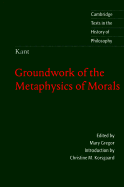Book contents
- Frontmatter
- Contents
- Introduction
- Chronology
- Further reading
- Groundwork of the Metaphysics of Morals
- Preface
- Section I Transition from common rational to philosophic moral cognition
- Section II Transition from popular moral philosophy to metaphysics of morals
- Section III Transition from metaphysics of morals to the critique of pure practical reason
- Notes
- Selected glossary
- Index
- Title in the series
Section II - Transition from popular moral philosophy to metaphysics of morals
- Frontmatter
- Contents
- Introduction
- Chronology
- Further reading
- Groundwork of the Metaphysics of Morals
- Preface
- Section I Transition from common rational to philosophic moral cognition
- Section II Transition from popular moral philosophy to metaphysics of morals
- Section III Transition from metaphysics of morals to the critique of pure practical reason
- Notes
- Selected glossary
- Index
- Title in the series
Summary
If we have so far drawn our concept of duty from the common use of our practical reason, it is by no means to be inferred from this that we have treated it as a concept of experience. On the contrary, if we attend to experience of people's conduct we meet frequent and, as we ourselves admit, just complaints that no certain example can be cited of the disposition to act from pure duty; that, though much may be done in conformity with what duty commands, still it is always doubtful whether it is really done from duty and therefore has moral worth. Hence there have at all times been philosophers who have absolutely denied the reality of this disposition in human actions and ascribed everything to more or less refined self-love. They did not, on account of this, call into doubt the correctness of the concept of morality but rather spoke with deep regret of the frailty and impurity of human nature, which is indeed noble enough to take as its precept an idea so worthy of respect but at the same time is too weak to follow it, and uses reason, which should serve it for giving law, only to look after the interests of the inclinations, whether singly or, at most, in their greatest compatibility with one another.
In fact, it is absolutely impossible by means of experience to make out with complete certainty a single case in which the maxim of an action otherwise in conformity with duty rested simply on moral grounds and on the representation of one's duty.
- Type
- Chapter
- Information
- Kant: Groundwork of the Metaphysics of Morals , pp. 19 - 51Publisher: Cambridge University PressPrint publication year: 1998
- 12
- Cited by



